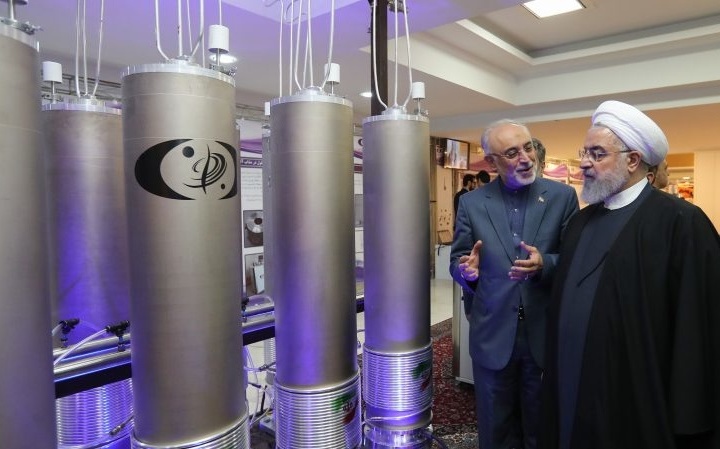President Hassan Rouhani (R) and the head of Iran’s Atomic Energy Organization Ali Akbar Salehi inspecting a nuclear plant, Tehran, April 9, 2019
Seeking vital economic links with Europe, Iran has warned again that it might withdraw from the 2015 nuclear deal with the 5+1 Powers (US, UK, France, Germany, China, and Russia).
The spokesman for the Atomic Energy Organization, Behrouz Kamalvandi, issued the latest declaration that Tehran is planning to return to the pre-2015 conditions, when it was enriching 20% uranium.
If the Europeans and the United States do not fulfill their commitments, we will balance out their actions under the deal by reducing commitments and taking the conditions back to how they were four years ago.
He added that the Joint Comprehensive Plan of Action was supposed to be an “exchange deal” but “what we were giving was way more than what we were getting in return”.
Under the terms of the deal, Iran halted production of 20% uranium — which potentially can be further enriched to military-grade 90% — and shipped all stocks out of the country.
However, following the failure to establish the European link to prop up a crippled economy under comprehensive sanctions, the Rouhani Government issued a 60-day deadline in May before it would begin suspending commitments.
In the last two weeks, Iran has breached the limit on stock of 3.67% uranium, stepping up enrichment to 4.5%, and resumed construction of the Arak heavy-water reactor, paused until a redesign could prevent plutonium by-product which can used for a nuclear weapon.
The European Union called for urgent talks. French President Emmanuel Macron has tried to mediate between Tehran and the Trump Administration, which withdrew from the nuclear deal in May 2018, imposed the comprehensive sanctions from November, and tightened this spring.
Iran Daily, July 7: Tehran Breaks Nuclear Deal’s Limit of 3.67% Uranium
The EU launched a Special Purpose Vehicle, known as INSTEX, in February for limited non-dollar trade in Iranian oil and other commodities and goods. Tehran rejected the mechanism because of “humiliating conditions” such as the EU’s concern over Iran’s missile program, activities in the Middle East, and alleged involvement in assassination and bomb plots in Europe.
Iran’s official oil exports are down 60% from April 2018, from about 2.5 million barrels per day to about 1 million bpd. Inflation has resurged from single digits to more than 50%, production and investment are sagging, unemployment — especially among youth — is rising sharply, and the currency is at a historic low.
Kamalvandi noted the Iranian steps suspending JCPOA commitments, explaining, “Iran’s decision to reduce its JCPOA commitments was not out of intransigence and rather aims to give diplomacy a chance and make the other party come to its senses and act upon its obligations.”
Zarif: Europe “Not Ready” to Invest in Nuclear Agreement
Foreign Minister Mohammad Javad Zarif also chided the EU as he arrived in New York for a UN meeting on Sunday.
“The Europeans claim they were willing to maintain the JCPOA, but we have not seen Europe yet to be ready for an investment,” he said.
Implicitly criticizing the EU for its conditions on the Special Purpose Vehicle, Zarif said expression of interest and preparedness to save an international agreement “is totally different from being ready to make the investments required to save that deal and the Europeans have not done that yet”.
UK Foreign Secretary Jeremy Hunt said today in Brussels at a foreign ministers’ meeting, “There is still a closing but small window to keep the deal alive,” Hunt told reporters on arrival for a foreign minister’s meeting in Brussels.
French Foreign Minister Jean-Yves Le Drian indicated that, while the EU wanted to preserve the nuclear deal, it would not give up its conditions for the economic link with Iran: “The Europeans have to stay united on this issue.”


“We May Pull Out of 2015 Nuclear Deal”
What are you waiting for, pull out.